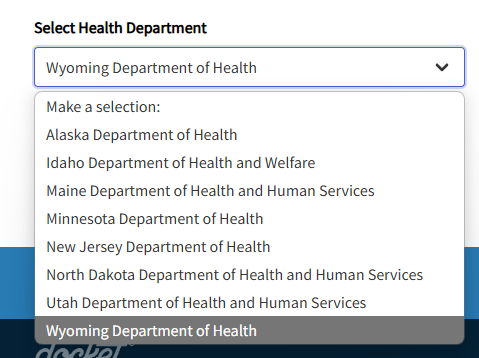Measles
What is it?
Measles is a highly contagious disease caused by a virus. It causes high fever, rash, cough and red eyes and can lead to life-threatening complications, like brain inflammation and pneumonia. Getting the MMR (Measles-Mumps-Rubella) measles vaccine is the best way to prevent getting and spreading measles.
What's happening in ND?
On Friday, May 2, 2025, North Dakota Health and Human Services (HHS) confirmed the state’s first case of measles since 2011. The case involves an unvaccinated child from Williams County who is believed to have contracted the illness from an out-of-state visitor. The individual is currently isolating at home to avoid spreading measles to others. HHS is contacting those who may have been exposed and advising unvaccinated individuals how long to quarantine.
The HHS webpage will regularly update information about measles in North Dakota, including confirmed cases, resources for specific settings and guidance for quarantine (if you have been exposed to measles) and isolation (if you are diagnosed with measles).
What should I do?
KNOW YOUR STATUS.
Each adult and child should know whether they are current on their MMR vaccination. Children receive their first dose of MMR at 12 months of age and their second between 4 and 6 years of age. The second dose can be given as early as 4 weeks (28 days) after the first dose.
In a measles outbreak, infants can receive a dose of MMR as early as 6 months of age, however, this dose will not be counted toward their MMR series. It is of utmost importance that individuals around infants receive an MMR vaccine to protect them against measles.

Immunization records can be obtained in certain states, including North Dakota, through Docket® (an app is also available). Individuals can also contact health provider clinics or health departments where childhood vaccines were received to obtain their records. In the absence of documentation (of at least one dose of MMR or laboratory confirmation of disease), individuals born in 1957 or later should receive one dose of MMR.
Two doses of MMR are recommended for individuals who are:
* School-age children
* Healthcare personnel
* International travelers
* Students attending post-high school educational institutions
How do I prevent the measles?
If you were born before 1957, you are considered immune to measles and, therefore no additional steps are needed.
For all others, the best way to prevent measles is to receive one MMR vaccine. Two doses are recommended for school-aged children (grades K-12), healthcare personnel, international travelers and students attending post-high school education institutions.
The MMR vaccine is safe and effective and the best way to prevent measles infection. One dose is about 93% effective and two doses are about 97% effective at preventing measles if exposed to the virus.
What if I suspect someone has measles?
If someone has a rash, fever, has recently traveled and is not vaccinated against measles, call your healthcare provider or urgent care facility. Follow their guidance about how to proceed so that the individual can be accurately diagnosed while still protecting others in the clinic from potential measles exposure.
What if I have been exposed to measles?
Call your healthcare provider, notifying them that you have been exposed to someone who has measles. They will determine if you are immune to measles based on your vaccination record, age or laboratory evidence. They will provide guidance to evaluate you, if needed, in such a way so that other patients and staff will not possibly be exposed to measles.
If you are not immune, the MMR vaccine or immune globulin may help reduce your risk of developing measles. Your healthcare provider will provide guidance based on your circumstances.
If you are not immune and did not receive the MMR vaccine, in accordance with the North Dakota Health and Human Services measles exclusion guidelines, you are to remain at home and be excluded from school or childcare for 21 days after exposure, regardless of the reason for not being immunized.
NEED to quarantine (stay home):
-People who have NOT had any doses of the measles vaccine
-People who are NOT immune to measles through prior infection
Do NOT need to quarantine (stay home):
-People who had one or more doses of the measles vaccine
-People who are immune to measles from prior infection
-People who were born before 1957
-People who received a measles vaccine within 72 hours of their first exposure
I have been diagnosed with measles; now what?
Stay home for four days after you develop the rash. Staying home is critical to avoid spreading measles to other people. Ask your healthcare provider when it is safe to be around other people again. Children will need to follow the school’s policy regarding when they can return.
What else can I do?
Following basic health hygeine etiquette is always recommended:
- Cover your mouth and nose with a tissue when you cough or sneeze and discard it. In the absence of tissue, cough or sneeze into your upper sleeve or elbow, not your hands.
- Wash your hands often with soap and water.
- Avoid sharing drinks or eating utensils.
- Disinfect frequently touched surfaces. Standard household disinfectants will readily kill the measles virus.
- Call your healthcare provider if you are concerned about your symptoms.

